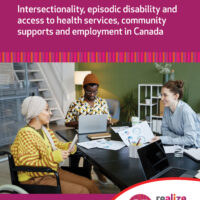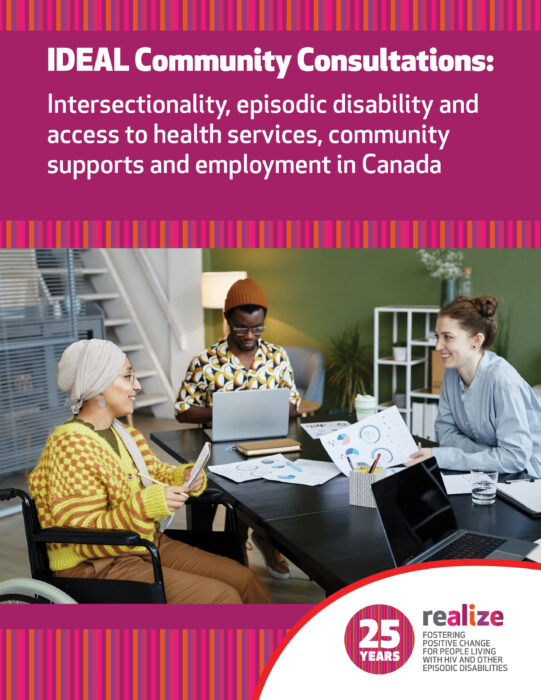
Ageism and Ableism in Canada’s HIV, HCV and STBBI Response – An Analysis
March 2024 — This analysis uncovers the layers of ableism and ageism embedded within Canadian STBBI policy as well as the lack of attention paid to HIV/HCV/STBBI prevention, testing, treatment and care in policies focused on disability and aging. Situating policy analysis within the context of thoughtful community discourse we aim to cultivate a deeper understanding of the challenges faced
by individuals at the intersections of disability, aging and STBBIs, while advocating for transformative change within policy frameworks.

Optimal Health and Wellbeing for People Living with HIV: The Role of Health Systems
 In July 2021 Jeffery Lazarus et al. published the Consensus statement on the role of health systems in advancing
In July 2021 Jeffery Lazarus et al. published the Consensus statement on the role of health systems in advancing
the long-term well-being of people living with HIV (“the statement”) in the journal Nature. The development of this
global statement involved participation from HIV experts from around the world, including two representatives from Canada. The statement culminated in six ‘key next steps’ to be taken by health systems to advance the long-term wellbeing of people living with HIV.
Realize, in collaboration with Gilead Sciences Canada Inc., and the National Community Advisory Group on
Optimal Health and Wellbeing (NCAG)*, coordinated six deliberative dialogues to determine whether the global
statement resonated with people living with HIV in Canada, and whether there are any modifications that should be made to ensure the ‘key next steps’ are relevant in the Canadian context.
This Report (Consensus Statement companion document) is the culmination of the deliberative dialogue process.

IDEAL Community Consultations
Intersectionality, episodic disability and access to health services, community supports and employment in Canada
 Throughout 2023, Realize worked with twelve national organizations serving people living with episodic disabilities to lead focused consultations within their respective communities. The focus was an intersectional examination into the living realities and various aspects of access barriers to health services, community-based organizations and employment for people living with episodic disabilities in the Canadian landscape. The participating organizations serve communities that provided unique intersectional considerations of gender, racial identity, faith community, health conditions, sexual identity, and age with disability.
Throughout 2023, Realize worked with twelve national organizations serving people living with episodic disabilities to lead focused consultations within their respective communities. The focus was an intersectional examination into the living realities and various aspects of access barriers to health services, community-based organizations and employment for people living with episodic disabilities in the Canadian landscape. The participating organizations serve communities that provided unique intersectional considerations of gender, racial identity, faith community, health conditions, sexual identity, and age with disability.
(Partner organizations involved: Alliance for South Asian AIDS Prevention, Ase Community Foundation for Black Canadians with Disabilities, Asian Community AIDS Services, Canadian Multicultural Disability Centre Inc., CanAge, Communities, Alliances, And Networks, DisAbled Women’s Network of Canada Disability Empowerment Equity Network Support Services, Live Educate Transform Society, National Educational Association of Disabled Students, Pride at Work Canada, and YouthCO.)
The objectives of this initiative were:
- To address the deficit of research on living with episodic disabilities through a disability-justice lens, led by people living with disabilities.
- To examine the realities that diverse disability communities are navigating.
- To better understand diversity in disability culture among subgroups such as youth, Muslims, 2SLGBTQIA+ folks and others.
- To broaden perspectives on people living with episodic disabilities and work.
- To examine access to and experience of health services and/or community-based organizations by diverse community members who are living with episodic disabilities.
- To increase the capacity of employers to respond effectively to the challenges facing people living with episodic disabilities and provide appropriate accommodations.
This Executive Summary includes key findings, a summary of insights, and links to each of the 12 partner reports.

Tips for people living with Long COVID on managing health care interactions and disability claims
This document is intended to help people living with Long COVID navigate the complex world of disability and employment claims. Returning to work with a complex, episodic illness is difficult. This document is a collection of recommendations based on the lived experiences of persons living with Long COVID, and clinicians working with people living with Long COVID.
A roadmap for disability income benefits for people living with Long COVID
If you have Long COVID and are seeking disability-related resources, this document may help you navigate social benefits and income support programs that are currently available in Canada.
4th HIV and Aging Symposium – Agenda
October 18th and 19th (2:00-5:00pm each day) and October 20th (12:00-3:00pm, virtual only), 2023
The 4th Canadian HIV & Aging Symposium, aptly titled: HIV and Aging WELL: WE Live & Learn Together, is co-hosted by Realize and the CIHR Canadian HIV Trials Network (CTN) Clinical Care Management Core. This event will facilitate information exchange and feature a diverse group of esteemed speakers and panelists, each with a unique perspective on the intersection of HIV and aging, including:
- Older adults and people aging with HIV
- Clinical, community-based and academic researchers
- Healthcare providers
- Policy change advocates
Program Assistant (Program Team) – Role Details and Job Description
Job posting September 2024
